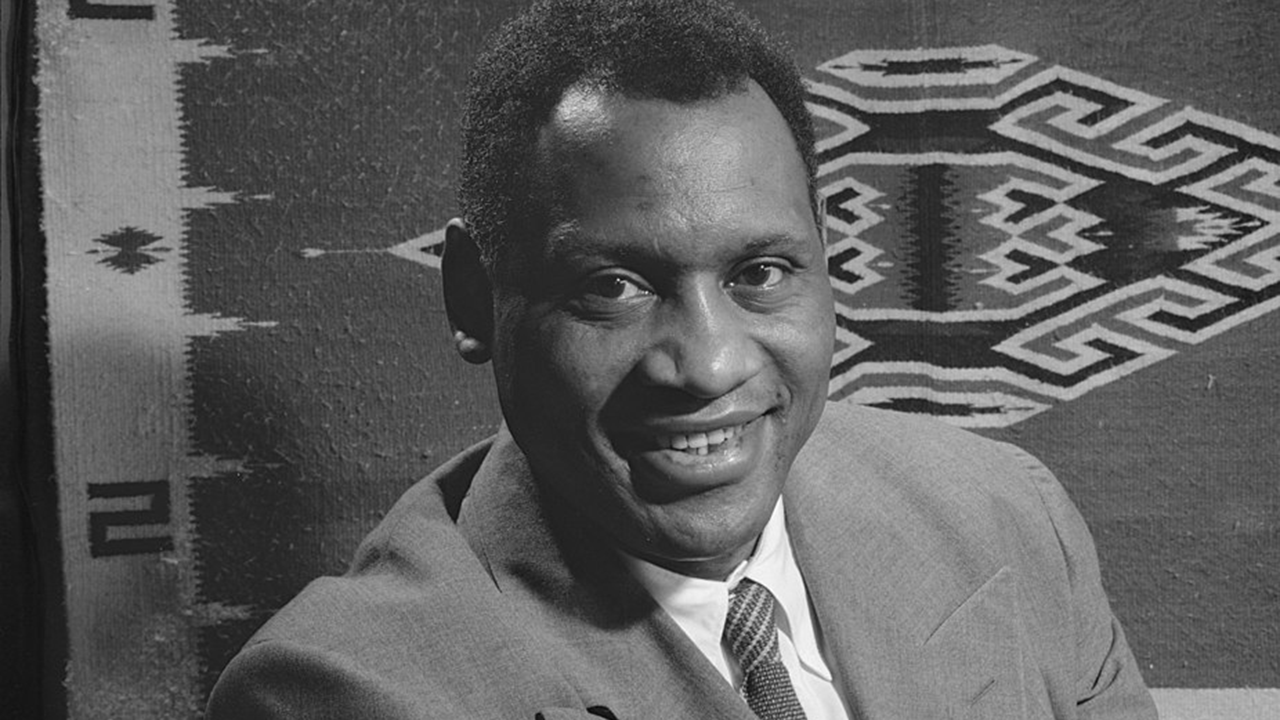Paul Robeson
In the kitchen when I was a boy were two record players. That’s what we called them. One was a hi-fi, and it was for my mother’s operas. The other was for us, my four brothers and me. It played old 78s. When I was around ten years old I found a trunk full of 78s. I put them on the record player one after another: Oscar Levant playing Gershwin; Ella Fitzgerald singing “Tisket-a –Tasket”; Bing Crosby suggesting “Don’t Fence Me In” and a host of others.
I enjoyed them all, but one floored me, left me stunned and moved to tears. It still does. A voice as deep as the ocean and as wide as the sky sang: “Our country's strong, our country's young, and her greatest songs are still unsung…. Deep as our valleys, high as our mountains, strong as the people who made it. For I have always believed it, and I believe it now, and you know who I am.” “Who are you?” a chorus asks and that proud, passionate voice answers, “America! … America!” The song was “Ballad for Americans” by John La Touche and Earl Robinson. But the voice that embodied the voice of America was Paul Robeson’s.
Paul Robeson was black, the son of a run-away slave. His father was a preacher so Paul sang in the choir. But that was only the beginning of a life propelled by staggering accomplishments. Twice named All-American as a member of the Rutgers football team, Robeson was also a star on the debating team and a lead actor in the college drama society. Although he was a member of the famous glee club, he would not sing with them outside the college grounds because they sang only to all white audiences. The only black student at Rutgers, Robeson was nonetheless elected valedictorian.
Robeson went on to Columbia Law School, paying his way by playing professional football and acting off Broadway. In 1924 Eugene O’Neill saw Robeson and gave him the lead in his controversial play “All God’s Chillun Got Wings” about a black man married to a white woman. The controversy brought the production to a temporary halt, so O’Neill revived “The Emperor Jones” for Robeson. Once “All God’s Chillun” opened, Robeson became the first black performer ever to star in a Broadway play.
In the meantime Paul Robeson continued to sing, mostly recitals of spirituals. He was signed to a contract by RCA Victor. His magnificent baritone earned him the admiration of Oscar Hammerstein, who late in the writing of “Showboat” decided to add a tune for the black river hand, Joe, to sing because Hammerstein wanted the part to be played by Robeson. The song was “Ol’ Man River.” In the event Robeson was not free to play Joe in “Showboat” on Broadway because of his contract with O’Neill, but when “Showboat” opened in London in 1928, Robeson first sang “Ol’ Man River.” The song and the singer fused becoming an international sensation.
By the time Paul Robeson recorded “Ballad of Americans” in 1940, he was known the world over not just as a concert singer and an actor, but as a tireless advocate of human rights and, especially, as an outspoken critic of racial injustice in America. In 1944, he met with the then Commissioner of Baseball, “Kennesaw Mountain” Landis, to argue for the integration of baseball. He was thrown out of President Truman’s office when he demanded that the President press for an anti-lynching bill in Congress. He made the mistake of telling the President if there was to be no law then blacks would have to defend themselves.
The fact that Robeson felt completely free of any racial restraint for the first time when he visited the Soviet Union blinded him to the bleak truths of Stalin’s Communism. While Robeson never became a member of the Communist Party in America, he was supportive of their goals and sympathetic to their call for disarmament and world peace. During the McCarthy witch hunts, all three of the originators of “Ballad for Americans” were branded as “un-American” and black listed. Robeson’s career was crushed, but he persisted in calling out racial violence and injustice.
Paul Robeson never stopped singing the songs he thought everyday people loved in 20 different languages, whether it was “Joe Hill” about the murder of a union organizer, “The Four Insurgent Generals” about the betrayal of the Spanish Civil War, “There is a Balm in Gilead” to ease the heart ache of his people, and, always, Paul Robeson sang “Ol’ Man River”. Yet he changed the words from “Ah gits weary/ An’ sick of tryin’/ Ah’m tired of livin’/ An skeered of dyin’”) to words of his own: “But I keep laffin’/ Instead of cryin’/ I must keep fightin’/ Until I'm dyin’.”



